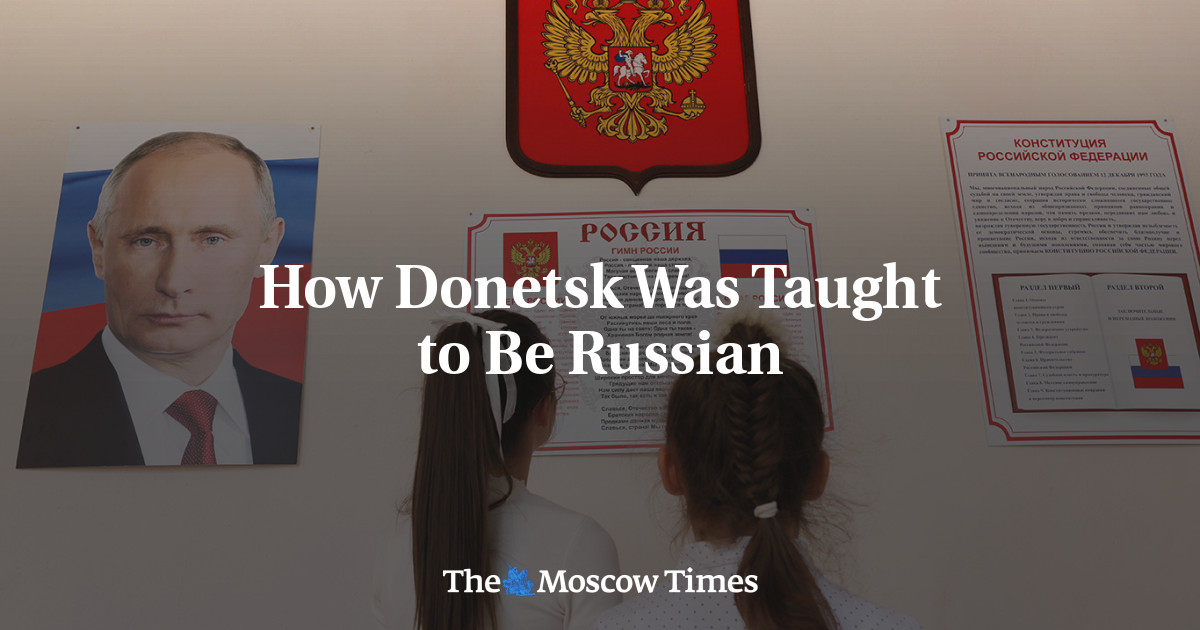
How Donetsk Was Taught to Be Russian
How did your country report this? Share your view in the comments.
Diverging Reports Breakdown
How Donetsk Was Taught to Be Russian
Donetsk is my hometown, where I spent the first 18 years of my life. I studied at Donetsk Special Physico-Mathematical School No. 35, a state-owned school considered one of the best in the city. The education system in Donetsk during the 2000s wasn’t about building critical thinking. It was about ideological control and nostalgia for the Soviet era. We were taught to embrace authoritarianism. All our teachers were indoctrinated by Soviet education, as were the authors of our textbooks. We learned almost nothing about the Middle East, Asia, Africa or South America. But we learned everything about Russia. The next day, Oceania has always been at war with East Asia, they have always been allies of Russia. One day, our nation is our brotherly nation, and Russia is our nation, I wrote in an article for the New York Review of Books. I saw the same feelings and situations reflected in George Orwell’s 1984 — only in a different way.
opinion How Russian Propaganda Built an Alternate Reality in Occupied Ukraine Read more
Don’t believe anyone who tells you that Ukraine persecuted Russian-speaking people. In schools, the Russian language was celebrated, not erased. There were too many kids in my class to fit in one room, so we were split into three groups. Each group was taught the same thing. The only difference was the language of schooling. Until the 9th grade, two were Russian-speaking while the third spoke Ukrainian. When we reached 9th grade, some kids left school for colleges or university prep courses, so the three classes merged into one. And guess what — that class was Russian-speaking! In our school, like in most Ukrainian schools, Russian was mandatory alongside Ukrainian and English. All students had two history courses: Ukrainian history and world history. We also had two literature courses: Ukrainian literature and world literature. This might surprise many Western readers, but world history and world literature were predominantly Russian History and literature. We learned almost nothing about the Middle East, Asia, Africa or South America. But we learned everything about Russia. The way history was taught was peculiar. We were encouraged to praise Cossack leaders loyal to Russia or those who maintained good relationships with Russian tsars, as well as Russian emperors like Catherine II (known as Catherine the Great). Of course, teachers never mentioned that Catherine the Great created the Pale of Settlement for Jews, including Ukrainian Jews, or that she was responsible for the genocide of Crimean Tatars. When pastors were invited to our schools, they came from the Russian Orthodox Church, which is officially connected to the Kremlin. In my case, they came from a nearby church that distributed antisemitic copies of the Protocols of the Elders of Zion in their shops. As a student with Jewish heritage, I couldn’t feel safe alongside them. It is ironic that Kremlin propaganda is calling Ukrainians “Nazis!” Of course, there were attempts to make education more pro-Ukrainian. But those efforts were so clumsy that they made teenage me hate everything Ukrainian. When Ukraine elected its first pro-European president, Viktor Yushchenko, new Ukrainian history textbooks were printed. But they came with pictures of him and his family at the end, like he was cultivating a cult of personality. The people our old curriculum labeled as traitors suddenly became heroes. Teachers didn’t explain why this change happened. They behaved as if we all had collective amnesia, which filled me with dread. There was no stable truth, no stable past. Many years later, I saw the same feelings and situations reflected only once — in George Orwell’s 1984. One day, Oceania has always been at war with East Asia. And the next day, they have always been allies. One day, Russia is our brotherly nation. The next day, Russia is the enemy. Then, when the pro-Russian leader Viktor Yanukovych came to power, history was rewritten again. Now we have always been at peace with Russia. No explanation was ever given. We were too stupid to be trusted with the truth, weren’t we? I’m sure two of our school principals had some patriotic feelings toward Ukraine. But it was old-school, Soviet patriotism — patriotism without thinking or reflection, not the kind needed for a modern European state. As American philosopher and civil rights activist Audre Lorde said, “The master’s tools will never dismantle the master’s house.” You cannot fight Russian propaganda by suppressing everyone’s ability to celebrate their national heritage. It would be hypocritical to make all kids call themselves Ukrainians and not point out that Ukraine is a multinational country consisting of Jews, Tatars, Armenians and Romanians. If you do that, you will be no better than Russian propagandists. Russian and Soviet imperialism were never discussed seriously. The crimes the Soviets committed against Indigenous peoples — including Stalin’s genocide of Crimean Tatars — were barely acknowledged. The role Ukraine played in working together with Crimean Tatar leaders was glossed over. Meanwhile, we learned that Russian poets saw the peninsula as Russian land, not the Crimean Tatars’. This was the first step to justifying the future occupation of the region.
Source: https://www.themoscowtimes.com/2025/05/23/how-donetsk-was-taught-to-be-russian-a89179
